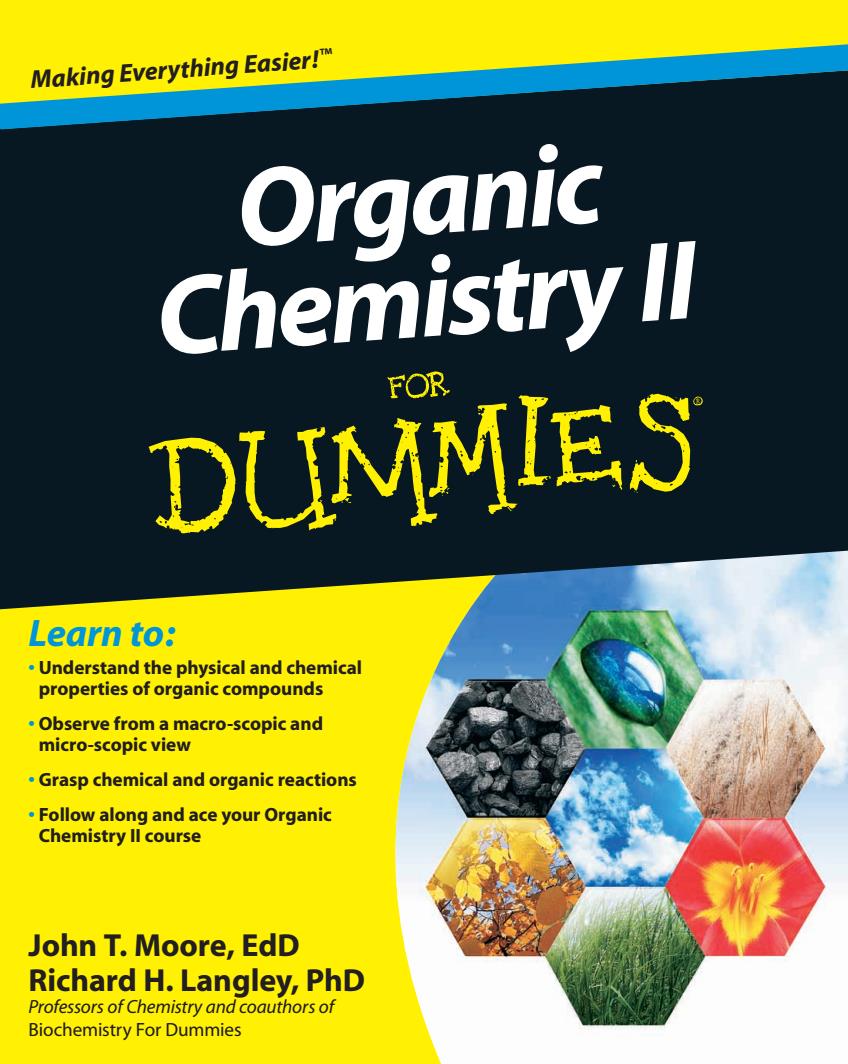正在加载图片...

Making Everything Easier!T Organic Chemistry ll FOR DUMMIES Learn to: Understand the physical and chemical properties of organic compounds Observe from a macro-scopic and micro-scopic view Grasp chemical and organic reactions Follow along and ace your Organic Chemistry ll course John T.Moore,EdD Richard H.Langley,PhD Professors of Chemistry and coauthors of Biochemistry For Dummies John T. Moore, EdD Richard H. Langley, PhD Professors of Chemistry and coauthors of Biochemistry For Dummies Learn to: • Understand the physical and chemical properties of organic compounds • Observe from a macro-scopic and micro-scopic view • Grasp chemical and organic reactions • Follow along and ace your Organic Chemistry II course Organic Chemistry II Making Everything Easier!™ Open the book and find: • A review of Organic Chemistry I • Clear descriptions of organic reactions • Spectroscopy of aromatic compounds and carbonyls • All you need to know about amines • An explanation of the infamous Grignard reaction • Hints for working with synthesis and roadmaps • Surefire ways to fail the course (and how to avoid them!) • Ten tips for increasing your exam scores John T. Moore, EdD, is Regents Professor of Chemistry at Stephen F. Austin State University in Nacogdoches, Texas. He is the author of Chemistry For Dummies. Richard H. Langley, PhD, teaches chemistry at Stephen F. Austin State University. Langley and Moore are coauthors of Biochemistry For Dummies. $19.99 US / $23.99 CN / £14.99 UK ISBN 978-0-470-17815-7 Science/Chemistry/Organic Chemistry Go to Dummies.com® for videos, step-by-step examples, how-to articles, or to shop! Your plain-English guide to understanding chemical reactions and tackling tests with ease Whether you’re confused by carbocations or baffled by biomolecules, this straightforward, easy-to-read guide demystifies Organic Chemistry II. From appreciating aromatic compounds to comprehending carbonyls, you’ll discover what you need to know about organic reactions in order to master the course and score high on your exams! • Get comfortable with the course — follow your coursework alongside the book, as it corresponds to a typical second semester college-level organic chemistry class • Refresh your knowledge of key topics — from mechanisms to alcohol and ethers, from conjugated unsaturated systems to electrophiles and nucleophiles, get prepped for Organic II • Grasp carbonyl group basics — get an overview of structure, reactivity, and spectroscopy before delving deeper into aldehydes and ketones, enols and enolates, and carboxylic acids and their derivatives • Ace advanced topics — take a closer look at nitrogen compounds, organometallic compounds, the Claisen Condensation and its variations, and biomolecules, such as carbohydrates, lipids, and proteins Organic Chemistry II Moore Langley spine=.7680